#commonplace books
Text
I'm extremely excited to announce that I'm writing a column on fans and fandom for Atlas Obscura!!! And the first piece went up today!!! This one is on sentiment albums—a variation on the commonplace book—and the threads connecting them to modern fan practices.
FYI: This piece features the work of the brilliant Dr. Evan Hayles Gledhill, who first introduced me to these albums when they were our guest on ep 10 (!!) of @fansplaining approx. 8,000 years ago.
It also features my own pre-modern-internet sentiment album. 🥰

#my writing#atlas obscura#fandom#fangirls#sentiment albums#commonplace books#buffy the vampire slayer#rupert giles#(hero librarian)
208 notes
·
View notes
Text
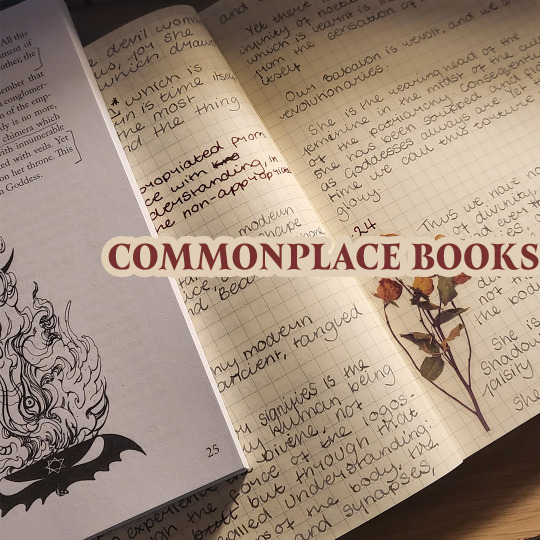
What is a commonplace book
Commonplace books are a method of compiling knowledge into one place, traditionally by handwriting but more recently with computers/word processors. They’re different from journals in that rather than containing exclusively personal thoughts or feelings, they’re a collection of external writings, informations, or other snippets of things recorded whenever it is encountered + usually organised.
To simplify – a commonplace book contains anything that captured it’s owners attention! Poems, extracts of fiction & non fiction writings, remarks or comments by others, anecdotes, observations, pertinent images, or other things along the same lines are all things that belong in a commonplace book!
Commonplace books have quite the history – their uses range between reading logs, reference books for students, and historically they were required by young women to demonstrate their upbringing.
How do they work
The exact system you use in your commonplace book is entirely up to you and what you will remember to use. Usually information is organised under themed/topic-based headings, but this can be as flexible or stiff as the keeper desires. My personal commonplace book is organised by source material – all of my book extracts & notes are kept together and demarcated by paperclips.
A commonplace book has no requirements in terms of physical format, size, page type, etc. As long as it is something you will be able to keep using happily! There is also no rules around decorating any pages with stickers or washi tape, or any rules around using sticky notes to add information on the go.
A commonplace book can also be as expansive or restricted as possible in terms of subject matter. For example, I keep a specific commonplace book for Babalon & Sekhmet. Nothing else enters this book.
What’s their use in religious practice or witchcraft?
A commonplace book can function as an in-between for a Grimoire (a book of magical knowledge and instruction, usually written by someone else and usually for transmitting knowledge within a specific tradition or branch of religion/witchcraft) & a Witchbook/Book of Shadows (more akin to a magical/religious journal for recordkeeping). They’re also exceptionally useful if you read a lot of metaphysical, occult or spiritual/religious books and want to keep organised notes in a hard copy form!
Commonplace books can be used to record interesting information from other, non-metaphysical but useful sources too, foraging notes and recipes are an obvious choice to keep a record of, along with notes about celestial events from astronomy sources.
In some cases, a commonplace book can also be a devotional activity, or a shrine of sorts. Commonplace books as a devotional activity is easy to parse – collecting and mindfully recording information about an entity, deity, divinity or other spirit is a good means to show care and interest.
A commonplace book as a shrine has a similar function to an e-shrine on tumblr, by collecting things that remind or represent an entity, deity, divinity or other spirit, a notebook can be made into a shrine or sacred object. This can also be a useful way to have a sacred touchpoint with an entity and keep it relatively out of sight, for those who are not open about their practice.
Examples
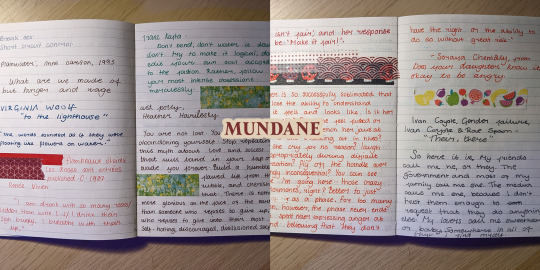
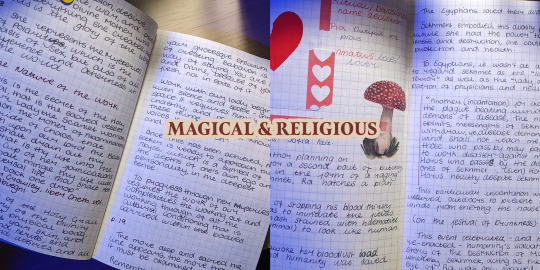
More reading on Commonplace books
https://en.wikipedia.org/wiki/Commonplace_book - The wiki page for Commonplace books that delves into their general & regional history, along with more variations on memory/infokeeping under See Also
https://notebookofghosts.com/2018/02/25/a-brief-guide-to-keeping-a-commonplace-book/ - A brief history & how-to on commonplace books, along with notable people that kept one.
https://bookriot.com/commonplace-book/ - An informal look at commonplace books, including using a tumblr blog/other digital formats as a commonplace book.
https://medium.com/thrive-global/how-and-why-to-keep-a-commonplace-book-ea80e25b63f1 - Information about commonplace books, alternatives to notebooks, and a small guide.
#witchblr#commonplace books#witchbook#book of shadows#grimoire#there are many uses for notebooks#magical recordkeeping#witchtips#witchcraft#recordkeeping
372 notes
·
View notes
Photo







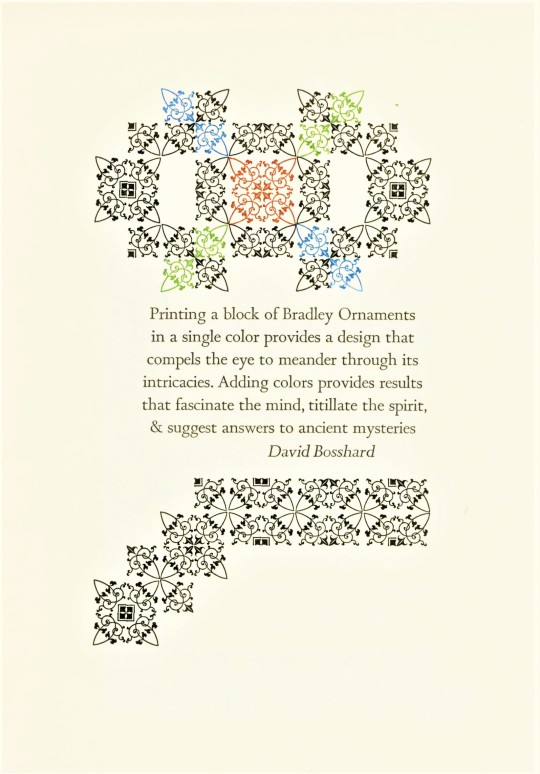


Typography Tuesday
Last week we highlighted a typographic display of David Bethel’s Glint type ornaments arranged and letterpress printed by the Milwaukee-born letterpress printer Michael Tarachow at his Pentagram Press. This week we present a selection of handset type displays by Tarachow from his 1988 book The Pentagram Press Commonplace Book, printed in an edition of 176 copies signed by the printer. This was his Tarachow’s first book printed in Minneapolis after moving there from Markesan, Wisconsin. He subtitles the book A Selection of Typographic Interpretations and states that it “required 112 press runs (time is the invisible factor!) on Arches Wove, which amounts to nearly 28,000 impressions.”
With the exception of George Bernard Shaw, the quotes are by type designers and letterpress printers: Leonard F. Bahr, Rudolf Koch, Eric Gill, Philip Gallo, Bruce Rogers, Wisconsin letterpress printer and outdoorsman David Brosshard, and Tarachow’s spouse and printing partner Merce Dostale. Click on the images to view the types used.
View other posts with work by the Pentagram Press.
View more Typography Tuesday posts.
#Typography Tuesday#typetuesday#Typography Tuesday#Michael Tarachow#Pentagram Press#The Pentagram Press Commonplace Book#commonplace books#type display books#type specimen books#george bernard shaw#Leonard F. Bahr#Rudolf Koch#Eric Gill#Philip Gallo#Bruce Rogers#David Brosshard#Merce Dostale
96 notes
·
View notes
Text
I was learning about commonplace books - a type of journaling where you collect notes and thoughts and quotes and that sort of thing. And maybe someone's made the connection already. But maybe that's why we all use and appreciate Tumblr still. It's like a little collection of reblogs and memes and life and thoughts and discourse and fiction and sometimes nonsense and bad takes. Humans have been collecting little bits of information and storing them in commonplace books for centuries now. And that's basically what we've all been doing and documenting our own thoughts in the tags. And I just am a little overwhelmed by the thought that my silly little personal blog connects me back to humanity in a way I didn't know before.
2 notes
·
View notes
Text
I want to get into making commonplace books. I just found out about it two days ago but I feel like that makes so much sense for my minds cape. All of the notes and ideas spread across Evernote, my various Notion databases, text messages and emails sent to myself and scribbles are just not...the goal. I can still have that and still do them, especially because I like far reach and spread and knowing if I lose a platform or an account I have back ups of everything I ever thought of, but having physical commonplace books for my archives of thought is a big yes.
And the day I have to put things in my time capsule(s), I will have those to give the world for later.
I firstly want to have a commonplace book for each of my ten core values:
Autonomy, Authenticity, Adaptability, Creativity, Curiosity, Connection, Community, Dignity, Discovery and Exploration.
I then want commonplace books on Value, Integrity, Love, Hate, Purpose, Desire, Violence, Life and Death.
Lastly, I want commonplace books on various systems of oppression, power structures and hegemonies/hierarchies.
One of each: Colonialism and Colonisation, Imperialism, Capitalism, Patriarchy, White Supremacy, Anti-Blackness, Anti-semitism, Anti-Indigenous, Queerphobia, Transphobia, Ableism and Sanism, Lookism and Uglification and Genocide in all its versions. I then want to bind them all together titled "The Hydra". Or maybe I'll buy just a big ass book and make them all a chapter of it.
I want my commonplace books to be part collage, part painting, part paper cut out, part paper pop up art, part essay. I want it to have so much texture and visuals and tie all the words and quotes of others with the reflections of my mind.
So, here's to another goal to add to my life!
#eyesoffatima#eyesof#mine#2022#my words#commonplace books#long term goals and dreams#life goals#writing#2022goals
7 notes
·
View notes
Text

A #zettelkasten or commonplace provides a catalytic surface to which ideas in the “solution of life” can more easily adhere to speed their reaction with ideas you’ve already seen and collected.
Once combined via linking, further thinking and writing, they can be released as novel ideas for everyone to use.
#catalysts#combinatorial creativity#commonplace books#statistical mechanics#Zettelkasten#note taking#Social Stream
2 notes
·
View notes
Text
found out about commonplace books and man i wanna make one. i might start a lil something something for myself nearing the end of the year but i'll take it a bit more seriously next year
3 notes
·
View notes
Text
Commonplace Books
The whole concept of a commonplace book is something that intrigues me because it goes to show that for many generations, many hundreds, if not thousands, of years, people have always gathered tidbits of information or images that have interested or inspired them to keep and share with others. Commonplace books have also evolved from a purely physical object to digital ones, such as blogs, vlogs, Instagram accounts, Twitter accounts, mobile note-taking apps, etc., for easier sharing. These records are preserved and show insight into what someone enjoyed or was thinking about at a specific time as well as what was important to them. And not only that, these people had the foresight to plan ahead and save these snippets so others could also benefit from the knowledge. Having a formal name for when I jot down interesting things, and knowing that others do the same, makes it just that much more special.
Date: learned about on Tuesday, August 23, 2022
Date: in-class discussion of commonplace books on Thursday, September 15, 2022
Source referenced for knowledge and inspiration: “How to Keep a Commonplace Book: 4 Benefits of Commonplacing - 2022.” MasterClass, https://www.masterclass.com/articles/how-to-keep-a-commonplace-book.
2 notes
·
View notes
Text
"Far from representing an edited canon of the best that had been thought and said, these commonplace volumes were understood to “be something you would gather and give to someone special"…"
1 note
·
View note
Text
"In an era of “girls-supporting-girls” and “let-people-enjoy-things”, having distinct tastes or opinions is tantamount to social suicide. There is no room for good-spirited teasing or critique or gossip or even interpersonal dislike. As much as I despise the phrase, these things are human nature. We possess the human range of emotions, which includes being annoyed or petty or mean-spirited—to pretend anyone is above it is not only moralistic but biologically false. When we don’t like someone or something, we scavenge to find a political or moral reason to critique them, instead of owning up to our honest truth: sometimes, you just find someone annoying.
Our crisis of niceness is both insufferable and detrimental to our artistic output; the films, art, and music we make are expected to promote pleasantness and punish everything else. We don’t see culture as a vehicle for artistic expression, but instead for moral expression, and as such our capacity for connoisseurship is at an all-time low. A film can be visually uninspired, a song can be derivative, a book can be poorly written, but as long as it espouses some rhetoric of universal justice it will be lauded as “important”. This is boring. It is uninspiring. If you even critique the mechanisms of the culture industry and its monopolized outputs (Marvel Movies, Taylor Swift, etc), you are deemed at best a hater and at worst a misogynist/racist/classist/homophobe depending on the day and the detractor.
It is a vague and meaningless form of pleasantry and niceness that does little more than create social codes of conduct concerning our language and discourse. It is Redbubble “Treat People With Kindness” stickers on MacBook Airs, it is a mass produced t-shirt with a slogan like You Matter <3 sold as mental health awareness. It feels suffocating, a cloying Yankee Candle atmosphere that gives nothing of substance yet demands a smile and a quiet wave.
We have confused pleasantness with kindness. Pleasantness is plasticine and sanitized, florescent lights over pastel bulletin boards. Kindness is human, old hardwood floors and fresh fruit.
Kindness is bringing your neighbors a bowl of chili, or sitting quietly with the people you love to reflect in the morning. Both actions somehow sparked mass outrage online and the individuals who shared their moments of quiet kindness were either called privileged or evil or any of the -ists that internet commentors love to toss around… classist, ableist, et cetera. The people who attempted to bring some joy into their own lives and the lives of others were called ugly and annoying in hundreds and thousands of replies within the same cultural space that insists that it is materially violent to say that you don’t like K-Pop or Taika Waititi."
-meditations on meanness - charlie
10K notes
·
View notes
Text
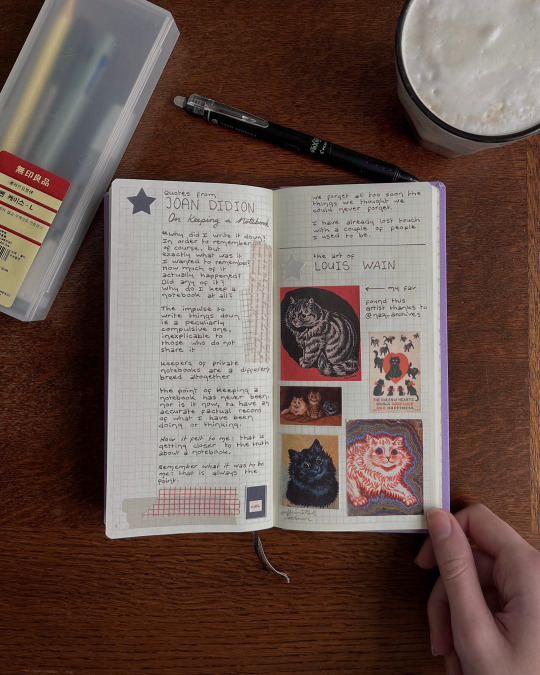
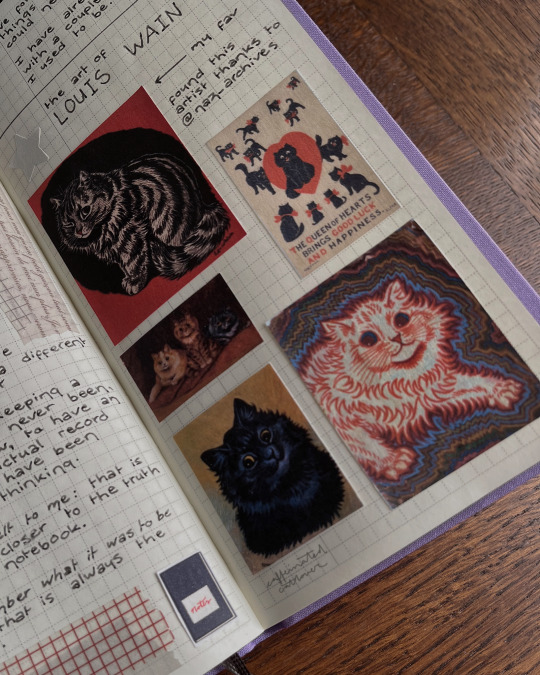
Commonplace pages about Joan Didion’s On Keeping a Notebook and the art of Louis Wain
#caffeinatedcatlover#journal#journaling#bujo#notebooks#studyblr#quotes#joan didion#louis wain#hobonichi#hobonichi weeks#commonplace journal#commonplace book#journal spread#coffee#coffee aesthetic#dark academia#dark aesthetic
906 notes
·
View notes
Text
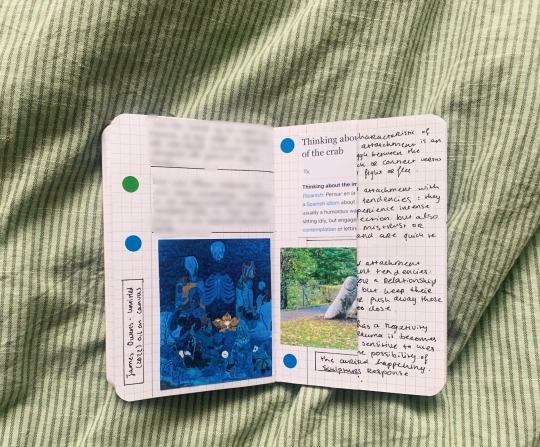
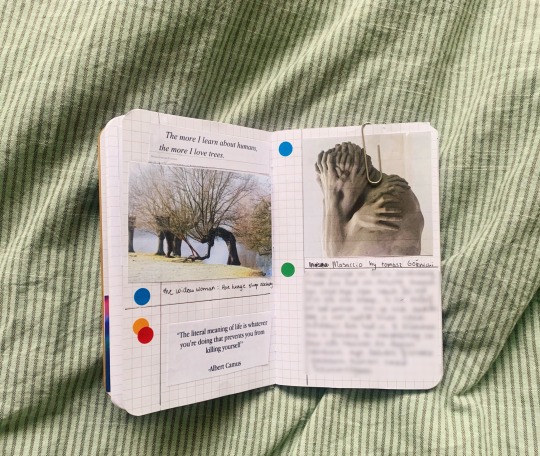


favorite pages from my third field notes: a lot of trees, hands and quotes from philosophy of emotion papers
#field notes#common place#common place book#own#field notes book#notebook#journal#journalling#commonplacing
585 notes
·
View notes
Text

little archives and their covers
480 notes
·
View notes
Text
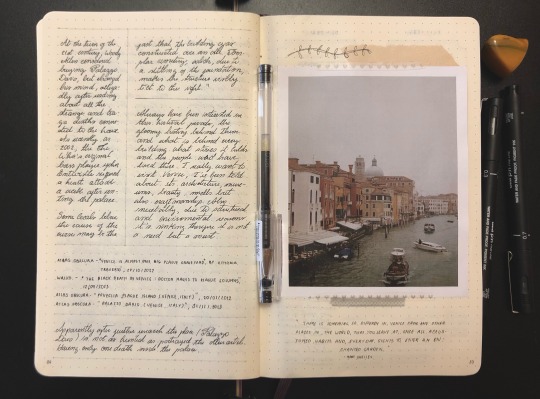
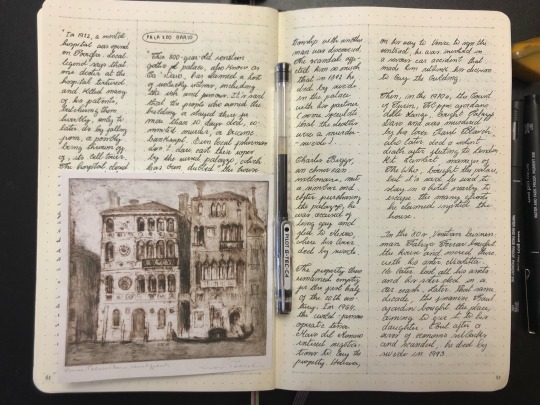
Commonplace on the secret and dark history of Venice in the plague time. Most of this information you can find on ‘Atlas Obscura’ and the ‘Walks’ website.
Did you know, that the places with high pavement in the city squares, often are that way due to the pile of bodies from plague times buried under it? 💀🪦
#notes#notebook#bullet journal#commonplace book#academia#commonplace journal#dark academia#spooky#venice#💀
551 notes
·
View notes
Text
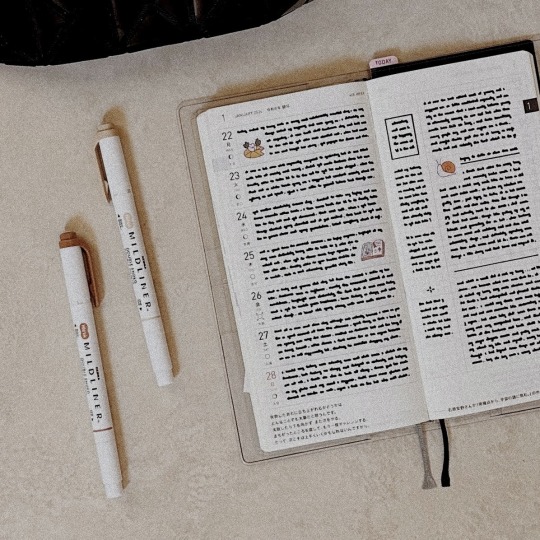
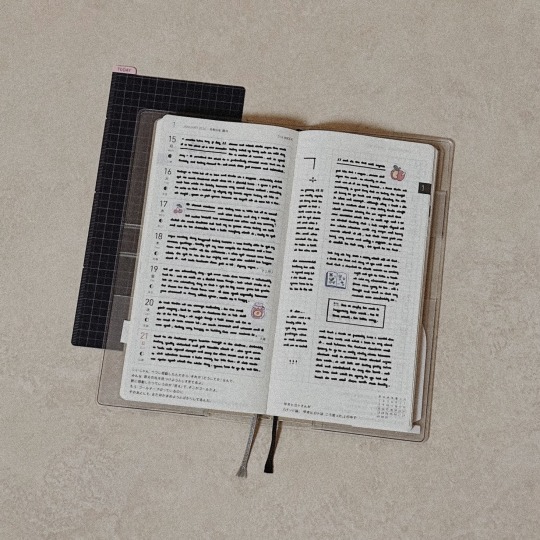

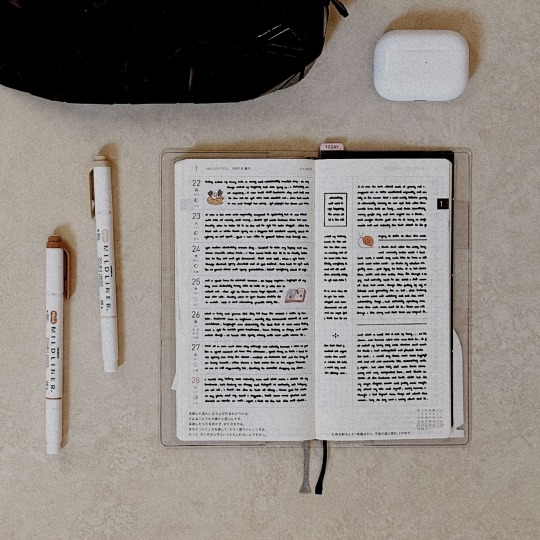
last weeks of january 📖
#hobonichi#hobonichi weeks#journal#zebra mildliners#hobonichitecho#journaling community#commonplace book#commonplace#passion planner#passion planner stickers#own
475 notes
·
View notes
Text
Creating a commonplace book or zettelkasten index from Hypothes.is tags

I thought it might be useful to have a relatively complete list of cross linked topical headings in my digital notebook (currently Obsidian) which is a mélange of wiki, zettelkasten, journal, project management tool, notebook, and productivity tool. First, let’s be honest that mélange is too poetic based on what I see of how others use Obsidian and similar tools. My version is structured to have very clear delineations between these forms even though I’m using the same tool for various functions.
I find that indexed subject headings can be useful for creating links between my wiki-like pages as well as links between atomic ideas in my digital zettelkasten. Gradually as one’s zettelkasten becomes larger and one works with it more, it becomes easier to recall individual ideas and cross link them. Until this happens or for smaller zettelkasten it can be useful to cross reference subject headings from one zettel to see what those link to and use those as a way to potential create links to other zettels. This method can also be used as a search/discovery aide for connecting edge ideas in new areas to pre-existing portions of one’s zettelkasten as well. Of course at massive scale with decades of work, I suspect this index will have increased value as well.
I don’t hear people talking about these types of indices for their zettelkasten in any of the influencer spaces or on social media. Are people simply skipping this valuable tool? For those enamored of Niklas Luhmann, we should mention that having and maintaining a subject index was a powerful portion of his system, even if the digitized version of his zettelkasten hasn’t yet been fully digitized. I haven’t seen the whole collection myself, but based on the condition of some of the cards in his index, Luhmann heavily used his subject index. (Note to self: I wonder what his whole system would look like in Obsidian?) Having a general key word/subject heading/topic heading index of all the material in one’s system can be very useful for general search and discovery as well. This is one of the reasons that John Locke wrote about a system for indexing one’s commonplace book in 1685. His work here is likely the distal reason Luhmann had one in his system.
Systems that have graphical knowledge graphs may make this process easier as one can look from one zettel out one or two levels to see where those link to.
Since such a large swath of my note taking practice starts by using Hypothes.is as my tool of choice, I’m able to leverage several years of using it to my benefit. Within it I’ve got 9,314 annotations, highlights, and bookmarks tagged with over 3,326 subject headings as of this writing.
To get all my subject heading tags, I used Jon Udell’s excellent facet tool to go to the tag editing interface. There I entered a “max” number larger than my total number of annotations and left the “tag” field empty to have it return the entire list of my tags. I was then able to edit a few of them to concatenate duplicates, fix misspellings, and remove some spurious tags.
An alternate way of doing this is to use a method described in this GitHub issue which shows how to get the tags out of local storage in your web browser. Your mileage may vary though if you use Hypothes.is in multiple browsers, which I do.
I moved this list from the tag editor into a spreadsheet software to massage the list a bit, clean up any character encodings, and then spit out a list of [[wikilinked]] index keywords. I then cut and pasted it into my notebook and threw in some alphabetical headings so that I could more easily jump around the list.
Now I’ve got an excellent tool and interface for more easily searching and browsing the various areas of my multi-purpose digital notebook.
I’m sure there are other methods within various tools of doing this, including searching all files and cutting and pasting those into a page, though in my case this doesn’t capture non-existing files. One might also try a search for a regex phrase like: /(?:(?:(?:<([^ ]+)(?:.*)>)\[\[(?:<\/\1>))|(?:\[\[))(?:(?:(?:<([^ ]+)(?:.*)>)(.+?)(?:<\/\2>))|(.+?))(?:(?:(?:<([^ ]+)(?:.*)>)\]\](?:<\/\5>))|(?:\]\]))/ (found here) or something as simple as /\[\[.*\]\]/ though in my case they don’t quite return what I really want or need.
I’ll likely keep using more local search and discovery, but perhaps having a centralized store of subject headings will offer some more interesting affordances for search and browsing?
Have you created an index for your system? How did you do it?
2 notes
·
View notes